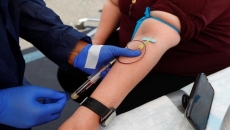Doctors who prescribe opioid painkillers should tell their patients about a potentially life-saving medication that can reverse drug overdoses, according to new federal guidelines issued Thursday.
The move by the Food and Drug Administration is the latest government effort to increase use of the drug naloxone, which can counteract the effects of an opioid overdose in minutes. Best known by the brand name Narcan, the drug is available as a nasal spray, injection and automatic injector.
Prescribing instructions for all opioids, such as Percocet and OxyContin, will recommend doctors discuss how to get the overdose-reversal drug, which can be obtained from pharmacists without a prescription. For patients with a higher risk of overdose, such as those with a history of opioid addiction, doctors should consider prescribing naloxone alongside the opioid. The same recommendations will appear on drugs used to control opioid addiction, such as methadone.
Nearly 71,000 Americans died of drug overdoses last year, a new record driven in part by fentanyl and other illegal opioids.
State and local officials have been handing out naloxone to police, first responders and families of people with a history of drug addiction in an attempt to reverse the multi-decade wave of opioid overdoses. Critics of the practice argue that giving it to pain patients does not address the growing share of fatal overdoses caused by illicit opioids.
Opioid medications can be addictive and dangerous even when used under doctors’ orders, though they are also an accepted tool to treat severe pain from serious injuries, surgery and cancer. Prescriptions have been falling in the U.S. since 2012, pressured by new laws and prescribing limits from state and local governments, insurers and hospital systems. Those limits restrict the number of pills, refills and who can prescribe opioids.






